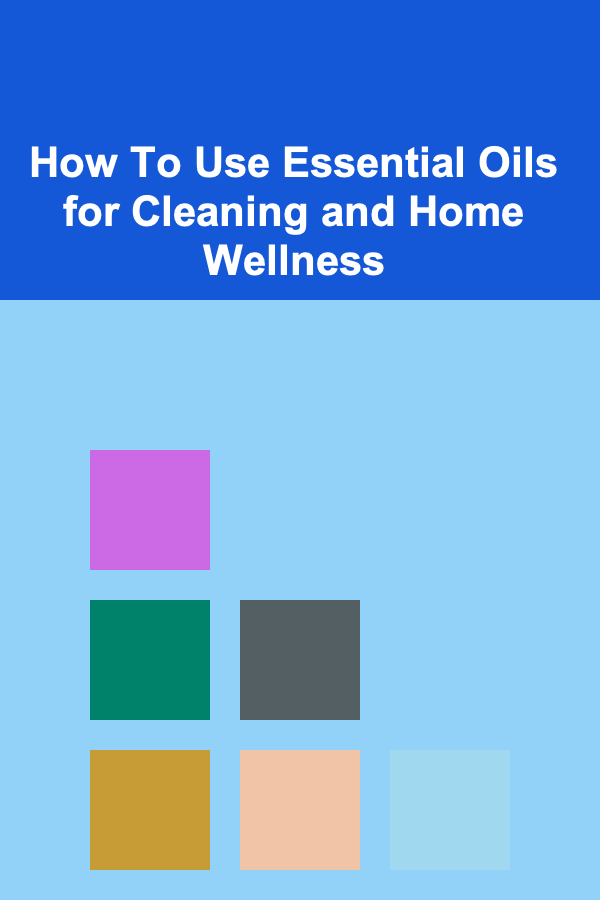
How To Use Essential Oils for Cleaning and Home Wellness
ebook include PDF & Audio bundle (Micro Guide)
$12.99$5.99
Limited Time Offer! Order within the next:

In recent years, essential oils have gained widespread popularity not only for their pleasant aromas but also for their powerful benefits in promoting physical and emotional well-being. Beyond their therapeutic uses in aromatherapy, essential oils can be powerful allies in maintaining a clean, healthy, and toxin-free home. By incorporating these natural oils into your daily cleaning routine, you can create an environment that is both fresh and rejuvenating, while avoiding harmful chemicals commonly found in commercial cleaning products.
This article will explore how you can effectively use essential oils for cleaning and home wellness, detailing the different oils that are best suited for various tasks, how to incorporate them into your cleaning routine, and the broader benefits of using essential oils to maintain a harmonious living space.
The Power of Essential Oils in Cleaning
Essential oils are natural extracts from plants, flowers, fruits, and seeds, and each oil has its unique properties. They have been used for centuries in different cultures for their medicinal, cosmetic, and cleaning properties. Modern science has confirmed many of these benefits, demonstrating that essential oils possess powerful antibacterial, antiviral, antifungal, and anti-inflammatory properties.
One of the key advantages of using essential oils for cleaning is that they offer a safe, natural alternative to synthetic cleaning products, many of which contain harsh chemicals. These chemicals not only pose risks to our health but can also have long-term detrimental effects on the environment. Essential oils, on the other hand, are biodegradable, and when used properly, they can effectively disinfect and deodorize surfaces without leaving behind harmful residues.
Popular Essential Oils for Cleaning
Before diving into how to use essential oils for cleaning, it's important to know which oils are best suited for different cleaning tasks. Below are some of the most commonly used essential oils for cleaning, along with their individual properties:
1. Lemon Essential Oil
Lemon essential oil is one of the most versatile oils for cleaning. It has strong antibacterial and antiviral properties and is known for its ability to cut through grease and grime. Its refreshing and uplifting citrus scent also helps to deodorize the air and refresh your living spaces.
- Best for: Degreasing kitchen surfaces, removing sticky residue, disinfecting, and freshening the air.
2. Tea Tree Essential Oil
Tea tree oil is widely regarded for its powerful antimicrobial properties, making it ideal for tackling germs, bacteria, and mold. It is effective in killing a variety of bacteria and viruses, and it also works well in tackling stubborn odors.
- Best for: Disinfecting, mold removal, and deodorizing, particularly in bathrooms and kitchens.
3. Lavender Essential Oil
Lavender essential oil is perhaps the most beloved essential oil for relaxation, but it also has notable cleaning properties. It has antibacterial, antifungal, and antiseptic qualities, making it a great all-purpose cleaner. The calming scent of lavender also helps promote wellness by reducing stress and creating a peaceful environment.
- Best for: General cleaning, deodorizing, and promoting relaxation and stress relief.
4. Peppermint Essential Oil
Peppermint essential oil is a natural powerhouse for cleaning, with strong antibacterial, antiseptic, and antifungal properties. It also has a refreshing, invigorating scent that helps to energize your mind and body.
- Best for: Disinfecting surfaces, cleaning countertops, and refreshing the air.
5. Eucalyptus Essential Oil
Eucalyptus oil is a natural disinfectant that is particularly effective in combatting viruses, bacteria, and fungi. It also works as a natural deodorizer, making it ideal for keeping your home smelling fresh and clean.
- Best for: Disinfecting, deodorizing, and combating airborne pathogens, especially during flu season or cold weather.
6. Orange Essential Oil
Like lemon oil, orange essential oil is rich in antimicrobial properties and has a fresh, uplifting citrus scent. It is gentle yet effective and works wonders on a variety of surfaces. Orange oil also contains compounds that can help remove sticky residues.
- Best for: Cleaning surfaces, removing sticky substances, and freshening the air.
7. Thyme Essential Oil
Thyme essential oil has strong antibacterial and antifungal properties, making it an excellent choice for disinfecting and cleaning in areas prone to mold or mildew. Its rich, herbal scent is also great for freshening up your space.
- Best for: Disinfecting, mold removal, and deodorizing.
How to Incorporate Essential Oils into Your Cleaning Routine
Using essential oils in your cleaning routine doesn't have to be complicated. With just a few simple ingredients, you can create powerful, natural cleaning solutions that will leave your home sparkling. Below are several ideas for incorporating essential oils into your cleaning routine.
1. DIY All-Purpose Cleaner
An all-purpose cleaner made with essential oils is one of the most versatile products you can use in your home. To make your own, combine the following ingredients in a spray bottle:
- 1 cup water
- 1 cup white vinegar
- 10--20 drops of essential oil (such as lemon, tea tree, or lavender)
Vinegar acts as a natural disinfectant, while the essential oils add extra cleaning power and a pleasant fragrance. Shake the bottle well before each use, and spray it on surfaces like countertops, tables, and bathroom fixtures. Simply wipe away the residue with a clean cloth for a streak-free, fresh finish.
2. Essential Oil Disinfecting Wipes
If you prefer the convenience of wipes, you can make your own disinfecting wipes with essential oils. To do so, you'll need:
- 1 cup water
- 1 tablespoon of rubbing alcohol or witch hazel
- 1--2 teaspoons of liquid castile soap
- 10--20 drops of essential oil (tea tree, lavender, or eucalyptus work well)
Combine all ingredients in a bowl, then dip reusable cloths (or a roll of paper towels) into the mixture. Wring them out until they're not too soggy, and store them in a sealed container for easy access. These wipes are perfect for wiping down kitchen counters, bathroom sinks, and even door handles.
3. Essential Oil Floor Cleaner
For a natural, eco-friendly way to clean your floors, mix the following ingredients in a mop bucket or container:
- 1 gallon of warm water
- 1/4 cup of vinegar or castile soap
- 10--20 drops of essential oil (lavender, lemon, or peppermint are great options)
Use a mop to clean your floors with this mixture, which will leave your home smelling fresh while thoroughly cleaning the surfaces. For particularly dirty floors, you can add a few more drops of essential oil or increase the amount of soap or vinegar.
4. Air Freshener and Deodorizer
One of the easiest ways to use essential oils in your home wellness routine is by creating a natural air freshener. Combine water and essential oils in a spray bottle and lightly mist the air whenever it needs a refresh. A simple mixture would be:
- 1 cup water
- 10--15 drops of your favorite essential oil (try orange, lavender, or eucalyptus for a fresh, calming scent)
Alternatively, you can make your own diffuser blend by adding essential oils to a diffuser to fill your home with a delightful fragrance. The essential oils not only freshen the air but can also boost mood and improve your overall sense of wellness.
5. Mold and Mildew Cleaner
Essential oils are highly effective against mold and mildew, which can thrive in damp areas like bathrooms, basements, and kitchens. Tea tree oil and eucalyptus oil are particularly good at combating mold. To make a mold-fighting cleaner, combine the following in a spray bottle:
- 1 cup water
- 1 tablespoon white vinegar
- 15--20 drops of tea tree or eucalyptus oil
Spray the affected area and let it sit for about 10--15 minutes, then scrub the surface with a brush or cloth. This natural solution will help eliminate mold and mildew while providing a fresh scent.
6. Essential Oil Laundry Freshener
Essential oils can also be added to your laundry routine to give your clothes a natural, refreshing scent while adding antibacterial properties. Simply add a few drops of essential oil to a cotton ball and place it in the dryer with your laundry. Lavender, eucalyptus, and lemon oils work particularly well. Alternatively, you can add a few drops directly to your laundry detergent for a boost of fragrance and cleansing power.
Benefits of Using Essential Oils for Home Wellness
Incorporating essential oils into your cleaning routine doesn't just improve the cleanliness of your home; it also offers numerous benefits for your overall health and wellness.
1. Improved Air Quality
Essential oils, especially those with antibacterial, antiviral, and antifungal properties, can help purify the air in your home. By using oils like tea tree, eucalyptus, and lemon, you can effectively reduce airborne bacteria and other pathogens, leading to a healthier living environment.
2. Reduced Exposure to Toxic Chemicals
Many commercial cleaning products contain harmful chemicals that can irritate the skin, eyes, and respiratory system. By switching to natural alternatives like essential oils, you can minimize exposure to these toxic substances and reduce their impact on your health.
3. Emotional and Mental Wellness
The scent of essential oils has a profound impact on mood and mental well-being. Oils like lavender, peppermint, and citrus oils can help reduce stress, improve concentration, and uplift the spirit. Using these oils in your cleaning routine not only helps keep your home clean but also contributes to a calming and rejuvenating atmosphere.
4. Enhanced Immune Support
Many essential oils have immune-boosting properties, which can help protect you and your family from illness. Oils like eucalyptus, thyme, and tea tree are known for their ability to kill germs and support a healthy immune system.
Conclusion
Essential oils are an excellent and natural alternative to conventional cleaning products, offering numerous benefits for both cleaning and overall wellness. By incorporating essential oils into your cleaning routine, you can reduce your exposure to toxic chemicals while creating a fresh, healthy, and invigorating environment in your home. Whether you're using oils for disinfecting, deodorizing, or promoting relaxation, essential oils are a powerful tool for maintaining both a clean home and a balanced lifestyle.
By choosing essential oils that suit your needs and following the simple DIY recipes above, you can easily transform your home into a sanctuary of cleanliness, freshness, and wellness.

How to Care for Exotic Pets in Your Home
Read More
How to Secure Your Garage and Shed from Intruders
Read More
How to Store Collectibles Without Damage
Read More
How to Use Furniture with Hidden Storage for Toys
Read More
How to Cut Down on Dining Out Expenses
Read More
How to Address Cultural Sensitivity in Event Programming
Read MoreOther Products

How to Care for Exotic Pets in Your Home
Read More
How to Secure Your Garage and Shed from Intruders
Read More
How to Store Collectibles Without Damage
Read More
How to Use Furniture with Hidden Storage for Toys
Read More
How to Cut Down on Dining Out Expenses
Read More